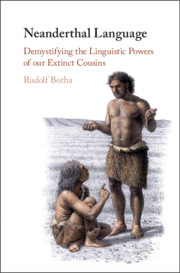Book contents
- Neanderthal Language
- Neanderthal Language
- Copyright page
- Contents
- Figures
- Images
- Acknowledgements
- Copyright Permission for Images
- Part I Preliminaries
- Part II Symbolic Behaviours
- Part III Non-symbolic Behaviours
- 8 Making Stone Tools
- 9 Teaching Stone-Tool Making
- 10 Hunting Big Game
- Part IV Implications
- Notes
- References
- Index
8 - Making Stone Tools
from Part III - Non-symbolic Behaviours
Published online by Cambridge University Press: 26 April 2020
- Neanderthal Language
- Neanderthal Language
- Copyright page
- Contents
- Figures
- Images
- Acknowledgements
- Copyright Permission for Images
- Part I Preliminaries
- Part II Symbolic Behaviours
- Part III Non-symbolic Behaviours
- 8 Making Stone Tools
- 9 Teaching Stone-Tool Making
- 10 Hunting Big Game
- Part IV Implications
- Notes
- References
- Index
Summary
Chapter 8 analyses and appraises a modern version of an inference about Neanderthal language drawn from data about the experimental making of stone tools by modern humans. This knapping inference looks skeletally as follows, the arrows depicting inferential steps: Modern humans knap Palaeolithic stone tools by means of action sequences structured in terms of hierarchies and recursion → Like modern humans, Neanderthals knapped stone tools by means of action sequences structured in terms of hierarchies and recursion → Like modern humans, Neanderthals processed language by means of action sequences structured in terms of hierarchies and recursion. Probing the submerged components of this inference, Chapter 8 advances two reasons for doubting its soundness. First, the two inferential steps are poorly warranted, involving weak analologies that disregard important differences between Neanderthals and modern humans. Second, the first inferential step lacks appropriate empirical grounding. That is, the sequences involved in the experimental knapping of stone tools by modern humans are not characterised by the hierarchies and recursion used by the syntax of human language.
- Type
- Chapter
- Information
- Neanderthal LanguageDemystifying the Linguistic Powers of our Extinct Cousins, pp. 111 - 121Publisher: Cambridge University PressPrint publication year: 2020



